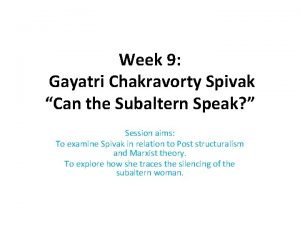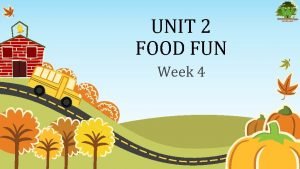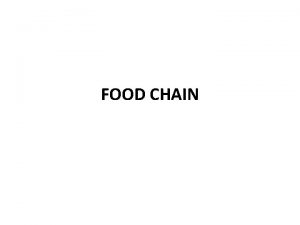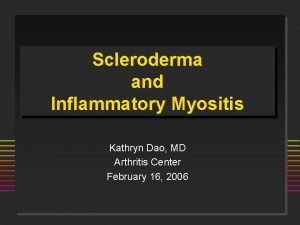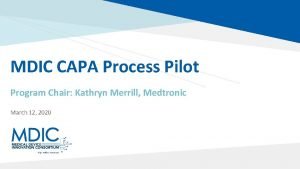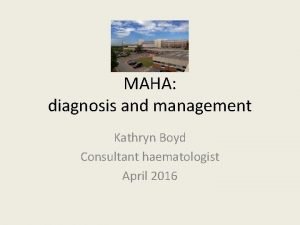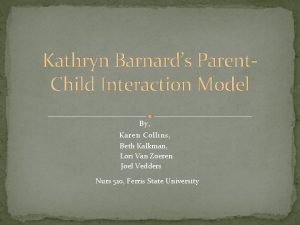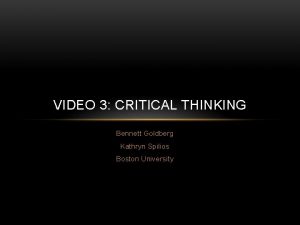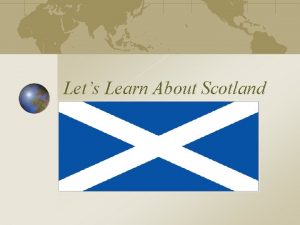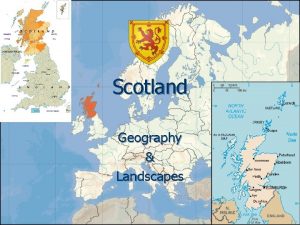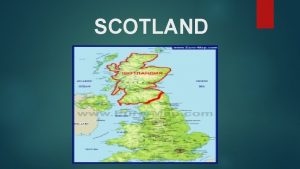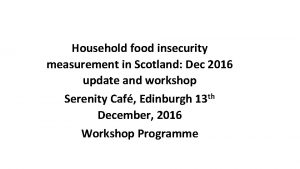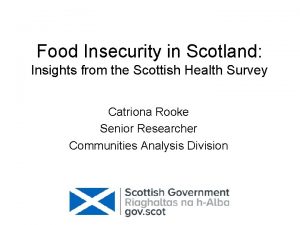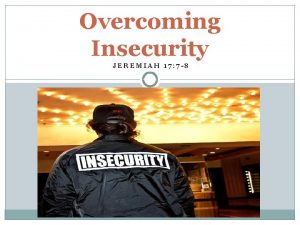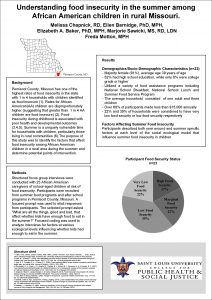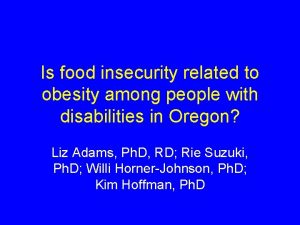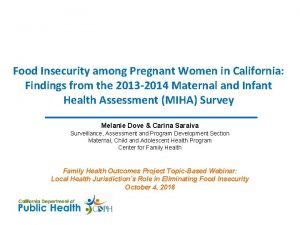Food insecurity among men in Scotland Kathryn E













- Slides: 13

Food insecurity among men in Scotland Kathryn E Machray MRC/CSO Social and Public Health Sciences Unit, University of Glasgow 6 th November 2018 MRC/CSO Social and Public Health Sciences Unit, University of Glasgow

Background: What is food insecurity? 1. Worrying about ability to obtain food 2. Compromising quality and variety of food 3. Reducing quantities, skipping meals UN FAO: http: //www. fao. org/in-action/voices-of-the-hungry/fie/en/ MRC/CSO Social and Public Health Sciences Unit, University of Glasgow 4. Experiencing hunger

Background: Prevalence • Between April 2017 and March 2018 1, 332, 952 three-day emergency food supplies given out by Trussell Trust across the UK • 170, 625 of these were handed out in Scotland • A 13% increase on the previous year and the fastest rate increase across the UK is in Scotland (Trussell Trust, 2018) Not the figures released today! MRC/CSO Social and Public Health Sciences Unit, University of Glasgow

Background: Who is affected? • More food banks than ever before; social security reform, universal credit • Study of demographics of 18 Trussell Trust Foodbanks found single men accounted for the largest proportion of food bank users (38%) (Loopstra & Lalor, 2017) • Scottish Health Survey – 3 questions from FIES – 8% of adults experienced food insecurity, majority single adults/lone parents MRC/CSO Social and Public Health Sciences Unit, University of Glasgow

Background: Consequences of food insecurity • Lower intake of fruits, vegetables and certain nutrients (Dixen et al 2001, Douglas et al 2015, Kirkpatrick & Tarasuk 2008) • Negative health outcomes (Holben & Pheley, 2006, Laraia, 2013, Seligman et al 2010, Vozoris & Tarasuk 2003) • Associated with increased risk of depression or incidence of major depressive episode in females (Coleman-Jensen et al 2016, Siefert et al 2001, Whitaker et al 2006) and psychological distress in males particularly single males (Ciciurkaite & Brown, 2018) MRC/CSO Social and Public Health Sciences Unit, University of Glasgow

Background: Gender and food insecurity • Gender differences in the experiences and outcomes of food insecurity (Ciciurkaite & Brown 2017, Siefert et al 2001 & 2004) • Marriage and long-term partnerships provide social support and other non-financial resources which help individuals during periods of financial stress/uncertainty (Cohen & Syme, 1985, Hobfall et al, 1996) • Gendered roles in the production and consumption of food MRC/CSO Social and Public Health Sciences Unit, University of Glasgow

Research Gaps • Limited understanding outside the setting of food banks • Men’s experiences are under-explored • Most work in the UK undertaken in English cities • Limited understanding of how coping strategies affect social relationships MRC/CSO Social and Public Health Sciences Unit, University of Glasgow

Research Aim and Questions • AIM: to explore the range and diversity of men’s experiences of food insecurity in Scotland • RQ 1: What are men’s perceptions and experiences across the spectrum of mild to severe food insecurity? • RQ 2: Are there similarities and differences in men’s experiences across urban locations in Scotland with different socioeconomic profiles? • RQ 3: How do men mitigate or cope with food insecurity and how does this affect their social interactions? MRC/CSO Social and Public Health Sciences Unit, University of Glasgow

Research Design: Methods • Photo elicitation interviews – participant driven • Promotes collaboration, mutual trust – participants are the experts by experience • Reflexive effect of photos MRC/CSO Social and Public Health Sciences Unit, University of Glasgow

Methods: Sampling Up to 30 participants (men sole adult in household) Mild Moderate Severe Aberdeen 5 5 5 Glasgow 5 5 5 MRC/CSO Social and Public Health Sciences Unit, University of Glasgow

Methods: Recruitment • Housing associations and other gatekeeper involvement • Social media • Attending community events • ? MRC/CSO Social and Public Health Sciences Unit, University of Glasgow

Methods: Data Collection • Two meetings: • First - Collect demographic information, identify food insecurity level and provide brief/ camera if required • Second - Conduct photo elicitation interview • Multiple encounters identified as useful in previous food insecurity research MRC/CSO Social and Public Health Sciences Unit, University of Glasgow

Email: k. machray. 1@research. gla. ac. uk MRC/CSO Social and Public Health Sciences Unit University of Glasgow MRC/CSO Social and Public Health Sciences Unit, University of Glasgow
